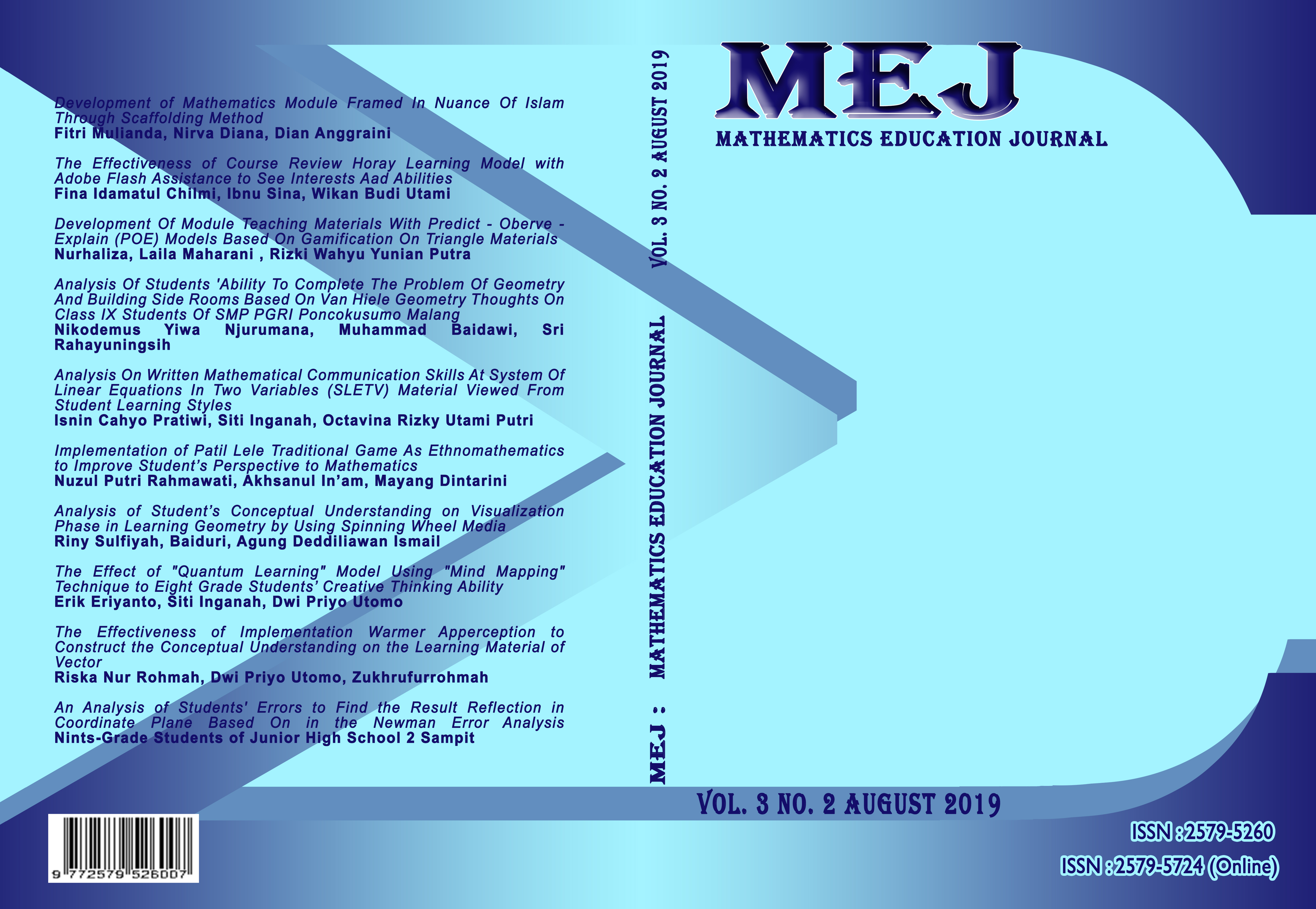The Effect of "Quantum Learning" Model Using "Mind Mapping" Technique to Eight Grade Students’ Creative Thinking Ability
DOI:
https://doi.org/10.22219/mej.v3i2.11072Keywords:
Quantum Learning, Mind Mapping, Creative ThinkingAbstract
This study aims to determine how the effect of the Quantum Learning model using Mind Mapping techniques to students' creative thinking abilities. The type of research used is experiment and quantitative approach with research design using posttest only group design. Data analysis of two groups used the t-test on SPSS 21, that is Independent Sample t-Test to test the difference in average posttest value of two samples.
The results of this study are (1) results of the t-test from post-test data obtain a significance 0,000 where it is lower than 0.05 so can be said that the average of the two groups are different, (2) from the post-test results, the answers given by students from the experimental group more fulfilled the indicators of creative thinking than students from the control group.
Downloads
References
Arifin, Z.. (2011). Quantum Learning and Teaching: Menuju Arah Pembelajaran Bermakna. Alfikra: Jurnal Ilmiah Keislaman, 10(1).
Arifin, Z. Sudarti, & Lesmono A. D. (2016). Pengaruh Model Quantum Learning Disertai Metode Eksperimen Terhadap Hasil Belajar Fisika Siswa di SMS Negeri Kalisat. Jurnal Pembelajaran Fisika, 4(4), 365–370.
Huda, Miftahul. (2013). Model-model Pengajaran dan Pembelajaran: Isu-isu Metodis dan Pradigmatis. Yogyakarta: PUSTAKA PELAJAR.
Mahmudi, A. (2010). Mengukur Kemampuan Berpikir Kreatif Matematis. Makalah disajikan pada Konferensi Nasional Matematika XV UNIMA. Manado: Jurusan Matematika UNY.
Mohiddin, D. P.. (2016). Pengaruh Model Pembelajaran Quantum Teaching dan Kemampuan Berpikir Matematis Terhadap Hasil Belajar Siswa. Jtech, 4(2), 90 – 93.
Putra, J.D., & Martini, J. (2015). Pengaruh Penerapan Quantum Learning dengan Mind Mapping terhadap Hasil Belajar Matematika Siswa Kelas VII SMP Negeri 1 Batam Tahun Pelajaran 2014/2015. PYTHAGORAS, 4(2), 43–55.
Putu, A. & Ida, B. (2016). Pengaruh Penerapan Strategi Pembelajaran Inovatif pada Pelajaran Biologi Terhadap Kemampuan Berpikir Kreatif Siswa SMA. ISSN 0215-8250: Jurnal Pendidikan dan Pengajaran IKIP Negeri Singaraja, (4)
Samad, I.. (2015). Peningkatan Hasil Belajar Matematika Melalui Pembelajaran Quantum Learning. Pedagogy,2(1).
Saifulloh, M., Muhibbin, Z., & Hermanto. 2012. Strategi Peningkatan Mutu di Sekolah. Jurnal Sosial Humaniora, 5(2).
Soedjadi, R.. (2000). Kiat Pendidikan Matematika di Indonesia. Jakarta: Direktorat Jendral Pendidikan Tinggi Departemen Pendidikan Nasional.
Sudia, M., & Majja, M. (2016). Pengaruh Motivasi Berprestasi Melalui Kombinasi Model Pembelajaran Kooperatif Terhadap Hasil Belajar Matematika. Jurnal Pendidikan Matematika, 7(1), 1–13.
Tirtawati, Ni L. R., Adnyana, P. B., & Widiyanti, Ni L. P. M.. (2014). Pengaruh Pembelajaran Kuantum (Quantum Learning) dan Peta Pikiran (Mind Mapping) Terhadap Keterampilan Berpikir Kreatif dan Hasil Belajar Biologi Siswa SMA. E-Journal Program Pascasarjana Universitas Pendidikan Ganesha, Program Studi IPA, 4.
Downloads
Published
Issue
Section
License
Authors who publish with MEJ (Mathematics Education Journal) agree to the following terms:
For all articles published in MEJ, copyright is retained by the authors. Authors give permission to the publisher to announce the work with conditions. When the manuscript is accepted for publication, the authors agree to automatic transfer of the publishing right to the publisher.
Authors retain copyright and grant the journal right of first publication with the work simultaneously licensed under a Creative Commons Attribution-ShareAlike 4.0 International License that allows others to share the work with an acknowledgment of the work's authorship and initial publication in this journal.
Authors are able to enter into separate, additional contractual arrangements for the non-exclusive distribution of the journal's published version of the work (e.g., post it to an institutional repository or publish it in a book), with an acknowledgment of its initial publication in this journal.
Authors are permitted and encouraged to post their work online (e.g., in institutional repositories or on their website) prior to and during the submission process, as it can lead to productive exchanges, as well as earlier and greater citation of published work (See The Effect of Open Access).

This work is licensed under a Creative Commons Attribution-ShareAlike 4.0 International License.










